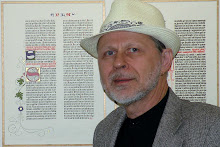19 October 2005
What makes the alien tick? I've listed some of the rules of engagement in the previous post, but what does it boil down to when we see Pol fall in love with Aaron. How can this being who is so much more than her human part become involved with what her own people refer to as a "plant?"
First off, there is the viewpoint of the "non-humanized alien." That is an area about which I can only begin to speculate. The alien is not just extraterrestrial. When we think about ETs, we contact the part that is essentially common to all intelligent life. Our SciFi literature is full of humans in lizard-suits. In doing that, we can encounter ETs of superior intelligence, better or more advanced technology--in general, superior races. We also encounter the primitives in most space operas. In nearly every instance, human inventiveness triumphs over the mis-applied alien intelligence, even when they are supposedly superior in every way. But what do we do with the essential otherness of the alien being. I don't believe that this race of aliens have any concept of "superiority", but just of complete otherness from the human race. They are, after all, alien.
This is the reason that the aliens must take on the form of creatures on earth in order to do the "gardening" that they do. They are raising intelligent beings and are not there to talk down to them or to manipulate them any more than parents are for their children. But this comes at a great price. What happens to the alien mind when it is molded into the form of a human?
First of all, they can communicate with the architects, but they are completely human when in human form. It is possible that they are more sensitive to the planet as a whole than other humans, and that they have no difficulty grasping their duality as both fully human and fully alien. But internally, they go through a life experience that is human. They are born, age, and die. There are some instances where the death event didn't take place in the normal way in that they dissolved their human bodies and moved to the base ship. So, even though the alien in human form is in touch with the global plan, she is subject to all the emotions and physical ills that any human is.
So, Pol struggles with knowledge of otherness with the feeling of sameness. As a result, since Aaron is genetically receptive to the presence of her otherness, she is inevitably drawn to his empathy as a remedy to her human loneliness. This is my justification.

3 comments:
> What happens to the alien mind when it is molded into the form of a human?
Zelazney wrote an interesting short story called "For a breath I tarry" which touches on this. It's about a computer's struggle to understand the human point of view. Worth a read, if only to see how another author dealt with a similar issue.
I'm thinking that the alien undergoes some severe limitations to take on the human form. They may be a little quicker mentally, have deeper insights, and even remember a little about what it's like to be alien, but mostly they function within the human mind and body. That's why they have to have "face-to-face" meetings with their superiors periodically for instructions. They understand they are alien, but it is very difficult for them to not be simply human. I'll check out Z.
Thxn.
Interesting. And, as long as they're so busy being and feeling human, I would imagine that it is frustrating for them, too, to understand that their human form limits them in those ways.
Post a Comment